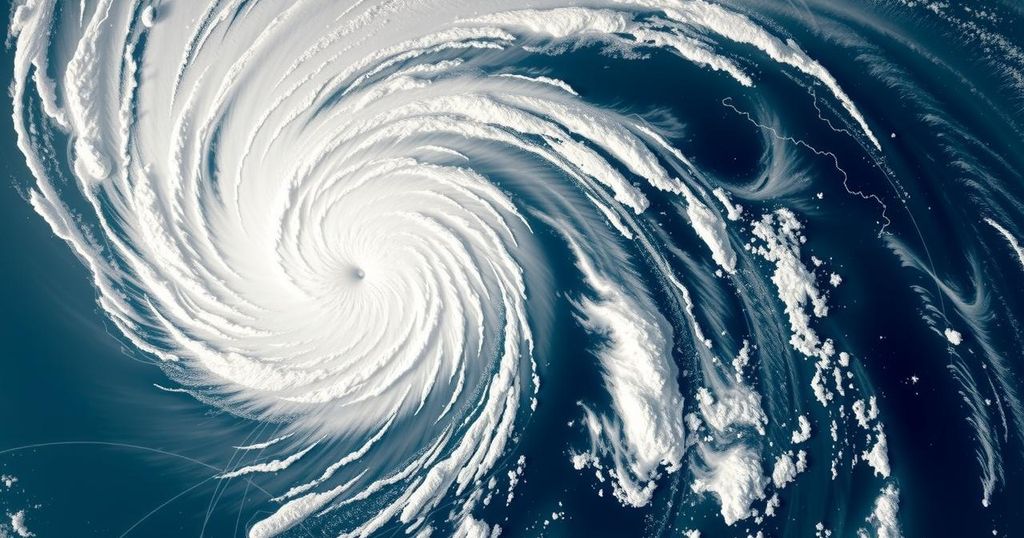Tropical Cyclone Chido has caused significant damage in Mayotte with winds over 220 km/h. No immediate casualties have been reported, but extensive destruction has been noted. As the cyclone moves towards Mozambique, authorities in surrounding regions are preparing for potential flooding and humanitarian crises, with warnings issued for significant health risks associated with stagnant water from the storm.
The French territory of Mayotte in the Indian Ocean has endured severe devastation following the onslaught of Tropical Cyclone Chido, which is now advancing towards the eastern coast of Africa. Winds exceeded 220 kilometers per hour, resulting in considerable destruction, including the dismantling of metal roofs across the islands that house a population of over 300,000. Fortunately, officials have not reported any immediate casualties.
Prefect Francois-Xavier Bieuville characterized this cyclone as the most violent and destructive since 1934, remarking on the extensive losses that many residents have faced. Mayotte remains under a red alert, prompting residents to shelter in secure locations while only emergency services are permitted to mobilize. Multiple reports indicate significant power outages, collapsed structures, and damaged infrastructure.
French Interior Minister Bruno Retailleau confirmed that the region had experienced substantial damage. He stated that both state and local emergency services are actively engaged in rescue operations. To bolster these efforts, 110 personnel from France and Reunion have been dispatched, with an additional 140 to follow shortly.
The cyclone has also impacted the nearby Comoros islands, where authorities are particularly concerned about a group of eleven fishermen who have gone missing at sea. In anticipation of the cyclone’s arrival, local officials have ordered the suspension of marine operations, as well as the closure of schools, airports, and government offices.
Forecasts predict that Cyclone Chido will maintain its trajectory towards Mozambique by late Saturday or early Sunday, threatening approximately 2.5 million individuals in the northern provinces. Surrounding nations, including Malawi and Zimbabwe, are likewise bracing for impending conditions, with advisories issued for potential flooding and evacuations.
The cyclone season, spanning from December to March in the southeastern Indian Ocean, has yielded increasingly severe storms in recent years. Past cyclones, such as Idai and Freddy, have resulted in significant casualties, revealing susceptibility in the region to severe humanitarian crises due to flooding and subsequent health risks associated with stagnant water, such as cholera, dengue fever, and malaria. Climate change is cited as a contributing factor to the growing intensity of these storms, with affected nations contributing minimally to global carbon emissions yet bearing extensive consequences.
The occurrence of tropical cyclones, particularly in the Indian Ocean region, has become increasingly frequent and severe due to climate change. The cyclone season typically lasts from December through March, with countries like Mozambique, Malawi, and Zimbabwe often facing harsh weather conditions that lead to extensive damage, loss of life, and significant humanitarian challenges. Past events, such as Cyclone Idai in 2019 and Cyclone Freddy last year, illustrate the alarming trend of escalating disaster impacts on vulnerable countries within this region that contribute minimally to global greenhouse gas emissions yet disproportionately suffer from climate-related disasters.
In conclusion, Cyclone Chido has wrought havoc on Mayotte, marking one of the most destructive weather events in nearly a century. As it approaches mainland Africa, measures are being taken to protect populations in Mozambique and surrounding regions from anticipated damages and health risks. This situation underscores a pressing need for global awareness and action regarding climate change, as vulnerable nations carry the brunt of its consequences.
Original Source: www.voanews.com






